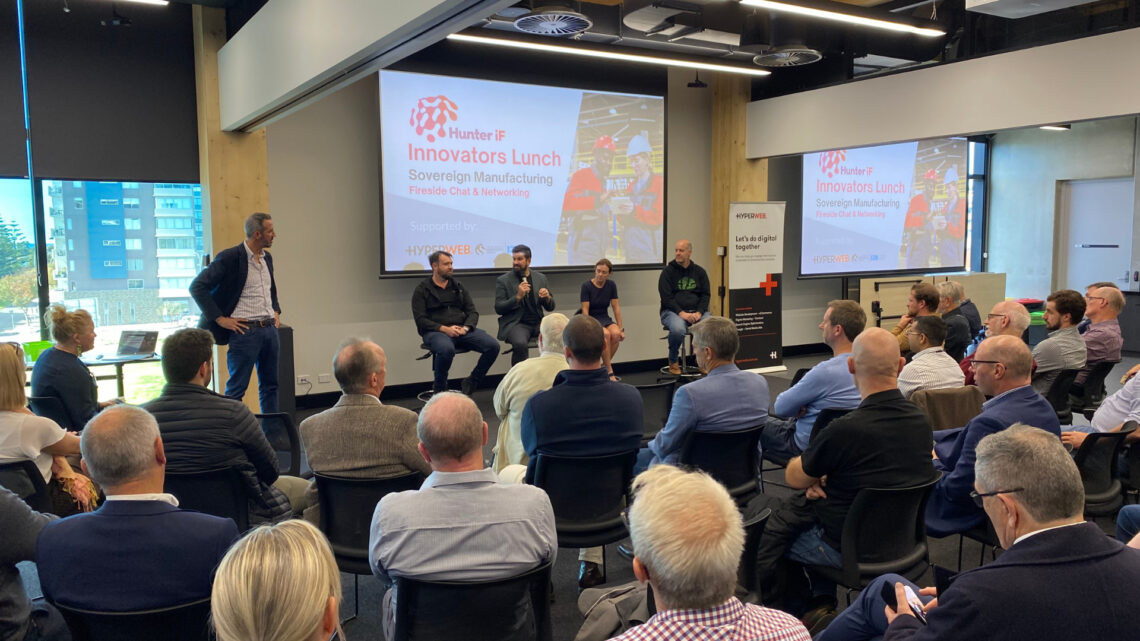Hunter iF Limited recent Innovators Lunch, held at the University of Newcastle’s I2N Hub Honeysuckle, brought together a panel of local manufacturers to delve into the concept of sovereign manufacturing. With a focus on Hunter Valley manufacturers, the panel discussed the challenges faced by the industry, particularly during the pandemic, and explored the potential benefits and feasibility of enhancing sovereign manufacturing capabilities.
This article provides an overview of the panel’s discussions and key takeaways from the event.
The panel consisted of Adam Amos, Director of Robotic Systems; James Bradley, Co-founder of Defuse Energy; Josh Jefferies, Principal of Design Anthology; and Kari Armitage, MD of Quarry Mining and Construction Equipment PTY LTD. Led by Alex Brenan, the discussions revolved around the recent struggles with parts and materials availability faced by the panellists’ organisations.
Each member shared stories of resilience, emphasizing the need for adaptability, local sourcing, and the integration of new capabilities to mitigate supply chain risks. Kari Armitage spoke of Quarry Mining’s new heat treatment capabilities, as one of only three located in Australia. James Bradley spoke to the advantages of local manufacturing in supporting rapid prototyping.
Despite recognizing the importance of sovereign manufacturing, the panel expressed scepticism about its current feasibility in the economic, business, and regulatory environment. Adam Amos went so far as to suggest that the advanced manufacturing supply battle has already been won and lost, with Australia continuing to focus on exporting its resources. Josh Jefferies highlighted the lack of economic incentives for investing in nation-level manufacturing, stating that if value were added to just the exported wool, it could surpass the entire agricultural sector in Australia.
The consensus among panel members was that improving sovereign manufacturing capabilities requires not only sovereign procurement but also sovereign demand for locally manufactured products. Trent Bagnall from The Melt, an audience member, emphasized the disparity in venture capital investment between manufacturing and SaaS startups, citing the challenges of investing in hardware. Bagnall outlined the need for a deeper technical understanding, longer payback periods, and increased capital and market risks associated with hardware prototypes.
The panel engaged in a productive discussion regarding potential ways to enhance sovereign manufacturing capabilities.
Several key questions emerged, including how to define and scope the requirements of sovereign manufacturing, how to create demand and value for sovereign products, and how to source and mitigate the risks involved. Some suggestions were put forth, such as focusing on achieving excellence rather than mere adequacy, mastering basic manufacturing before venturing into advanced techniques, and sharing the risk by defining and regionalizing core sovereign manufacturing capabilities.
The panel also touched upon the role of government assistance in supporting sovereign manufacturing. Concerns were raised about the pace and effectiveness of such assistance, with some considering it an additional burden in terms of debt and reporting requirements. Kari Armitage highlighted the presence of skilled individuals and organizations in the Hunter region, underscoring the need for a clear transition plan for employees in and supporting the coal industry to meaningful and valued future roles aligned with the evolving manufacturing landscape.
The Innovators Lunch on Sovereign Manufacturing provided valuable insights into the challenges and potential of enhancing manufacturing capabilities at a national level.
While acknowledging the difficulties and scepticism surrounding the current economic environment, the panellists stressed the need for sovereign demand and the creation of value through excellence. By addressing fundamental questions, exploring regionalization possibilities, and aligning government support, the path toward improved sovereign manufacturing can be charted, empowering local industries and strengthening supply chains.
